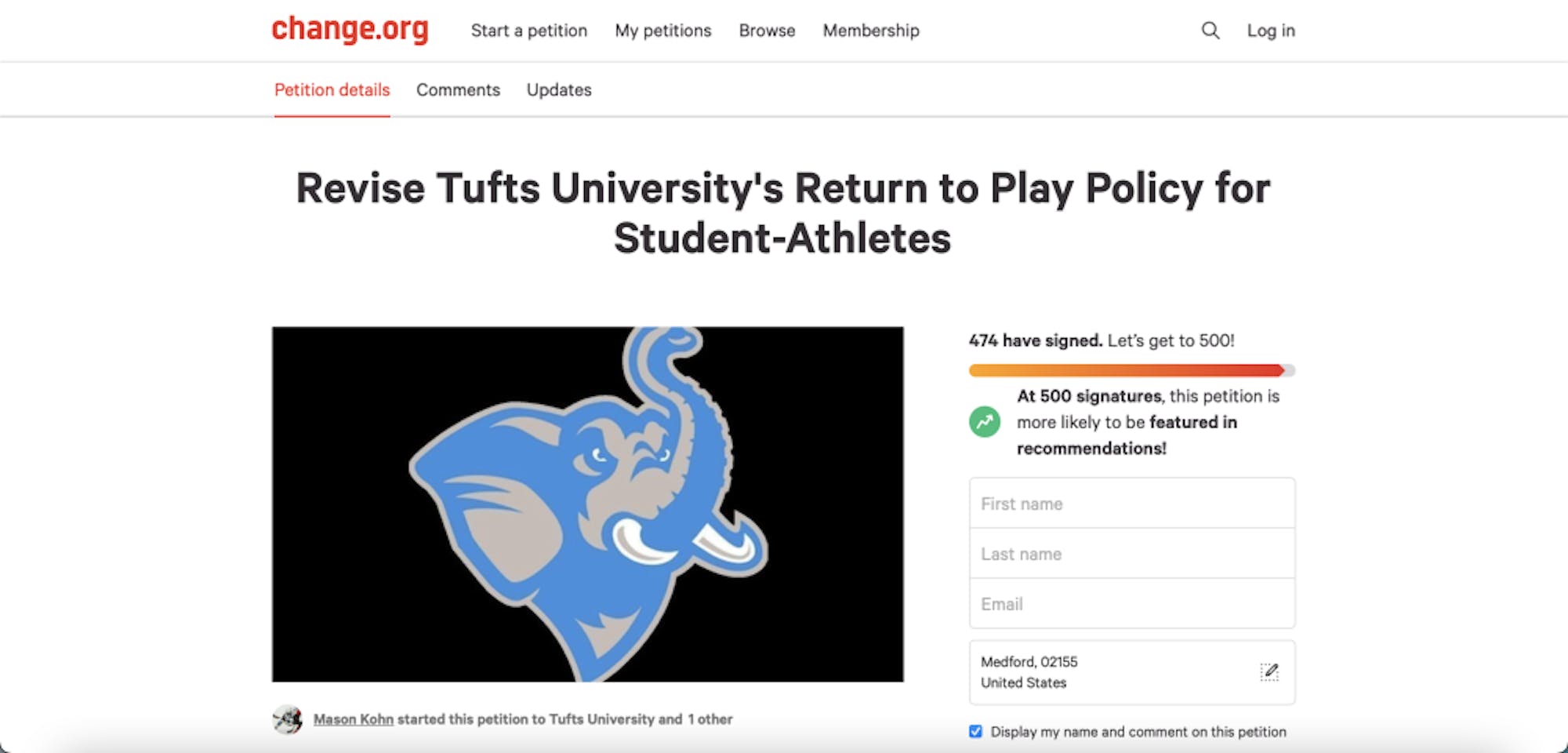On Jan. 11, a student petition on Change.org circulated that contested Tufts' COVID-19 return-to-play protocols. According to the petition, Tufts requires student-athletes who test positive for COVID-19 to wait about 12 days, including a two-day reconditioning process, returning to play or practice. While this information has yet to be verified by either the athletic department or the university health department, the petition already has received over 450 signatures.
The petition came in response to an email sent to student athletes outlining strict COVID-19 policies that do not align with the NCAA's recommendations for return to play, which include only a five-day isolation period before returning to team activities based on player discretion and a negative test.
Tufts Director of Athletics John Morris reported that the university’s policy for return to play allows a student athlete who tests positive for COVID-19 to return to practice on the 11th day following their positive test, with involvement in competition beginning on the 12th day, as long as they have been medically cleared to do so.
“This approach is consistent with the policies of our NESCAC peers and many other institutions, and it helps us strike a balance between protecting the campus community by slowing the spread of the virus and allowing our student-athletes and teams to compete safely in as many games as possible,” Morris wrote in an email to the Daily.
Meanwhile, student-athletes who test positive at Tufts risk missing about two weeks of their season, amounting to a possible four to six games, which is a significant chunk of the season for some teams. The consensus among student-athletes seems to be that the choice to play after the five-day period should be left in their own hands. Katrina Yuzefpolsky, a member of the varsity softball team, argues that the university is overreaching its authority.
“[Students] can consult professionals and people that we have available to us to decide whether or not it's the best choice for their own health to come back, but it's not fair for the university to create these extended guidelines when our own CDC is advising otherwise," Yuzefpolsky said. "I understand being cautious but [only] to an extent.”
However, other student-athletes disagree with rushing back to play after contracting COVID-19 due to health concerns. Varsity rower Alex Maykel believes that students should prioritize their health and take the two weeks to rest before returning to play.
“Honestly, I still have a cough today from [COVID-19], so I think that maybe rushing into it too fast … created long term issues for myself that were easily avoidable," Maykel, a junior, said. "So, as far as the long term, I totally think that you should take as much time off as necessary."
Asking student-athletes to continue to make sacrifices without proper transparency has caused a great deal of concern among students who have to balance playing sports with an intense academic workload while maintaining a social life. Golfer Conor O'Holleran explains why the lack of transparency can be an issue.
“With these overly stringent guidelines in place, not only do athletes have to worry about missing part of their season, we also have to make choices about the people we see and things we do that could expose us to [COVID-19] more than out-of-season athletes or non-athletes,” O’Holleran, a sophomore, said. “This could lead to forfeiture of games or even a cancellation of our season. Sports with shorter schedules are at an even higher risk of missing an entire season if there is a team outbreak.”
Hockey player Cameron Cokinos is also concerned about the future of these protocols.
"My question for Tufts would be, what's their plan going forward? Are we just going to be in a perpetual state of emergency? Is that just never going to change?" Cokinos, a sophomore, said. "Or [are] we eventually going to stop testing asymptomatic athletes? … Should we be testing people that are at risk, with symptoms? Probably, but do we need to continue if this does become more endemic? Are we going to just continue testing asymptomatic people forever? I don't know where the policies end."
Above all, students desire consistency and transparency from Tufts regarding decision-making. Lacrosse player Anna Clarke has some suggestions about what Tufts could have done to prevent confusion when making these types of decisions.
“I feel like Tufts maybe could have been more proactive about that. … If they gave their reasoning right away, then people might be more accepting of the fact that they have to sit out for longer,” Clarke, a senior, said.
Morris acknowledged student concerns and explained that expediting a return-to-play process remains one of the athletic department’s top priorities alongside emphasizing and maintaining public health protocols.
“While we support the return of our student-athletes to practice and competition as quickly as possible after injury or illness, the health and safety of our student-athletes, staff, and the university community remains our top priority,” Morris wrote.






